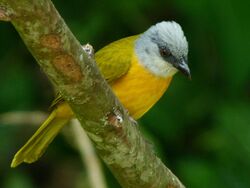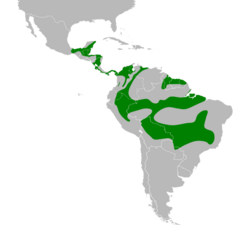Biology:Grey-headed tanager
| Grey-headed tanager | |
|---|---|

| |
| At Manizales, Caldas, Colombia | |
| Scientific classification | |
| Domain: | Eukaryota |
| Kingdom: | Animalia |
| Phylum: | Chordata |
| Class: | Aves |
| Order: | Passeriformes |
| Family: | Thraupidae |
| Genus: | Eucometis Sclater, PL, 1856 |
| Species: | E. penicillata
|
| Binomial name | |
| Eucometis penicillata (Spix, 1825)
| |

| |
The grey-headed tanager (Eucometis penicillata) is a widely distributed species of small Neotropical bird in the tanager family Thraupidae. It is the only member of the genus Eucometis.
It is found in Central America and northern South America from Mexico to Brazil. Its natural habitats are subtropical or tropical moist lowland forest, subtropical or tropical swamps, and heavily degraded former forest.
Taxonomy
The grey-headed tanager was formally described in 1825 by the German naturalist Johann Baptist von Spix under the binomial name Tanagra penicillata.[2] Spix did not specify a type locality by this was later designated as Fonte Boa in the Brazilian state of Amazonas.[3] The grey-headed tanager is now the only species placed in the genus Eucometis that was introduced by the English zoologist Philip Sclater in 1856.[3][4][5] The genus name is derived from Ancient Greek eukomēs meaning "with lovely hair". The specific epithet penicillata is from the Latin diminutive of peniculus meaning "brush".[6]
Within the Thraupidae, the grey-headed tanager is a member of the subfamily Tachyphoninae and is the sister species to the black-goggled tanager in the monospecific genus Trichothraupis.[7]
Seven subspecies are recognised:[5]
- E. p. pallida Berlepsch, 1888 – southeast Mexico to Honduras
- E. p. spodocephalus (Bonaparte, 1853) – Nicaragua and north Costa Rica
- E. p. stictothorax Berlepsch, 1888 – west-central Costa Rica to west Panama
- E. p. cristata (Du Bus de Gisignies, 1855) – east Panama, north Colombia and northwest Venezuela
- E. p. affinis Berlepsch, 1888 – north Venezuela
- E. p. penicillata (Spix, 1825) – southeast Colombia, east Ecuador and east Peru east through the Guianas and north Brazil
- E. p. albicollis (d'Orbigny & Lafresnaye, 1837) – Bolivia and Paraguay through central Brazil
References
- ↑ BirdLife International (2018). "Eucometis penicillata". IUCN Red List of Threatened Species 2018: e.T22722343A132014914. doi:10.2305/IUCN.UK.2018-2.RLTS.T22722343A132014914.en. https://www.iucnredlist.org/species/22722343/132014914. Retrieved 12 November 2021.
- ↑ von Spix, Johann Baptist (1825) (in Latin). Avium species novae, quas Brasiliam anus MDCCCXVII - MDCCCXX. 2. Monachii [Munich]: Franc. Seraph. Hübschmanni. pp. 36-37, Plate 49 fig. 1. https://www.biodiversitylibrary.org/page/41277991.
- ↑ 3.0 3.1 Paynter, Raymond A. Jr, ed (1970). Check-List of Birds of the World. 13. Cambridge, Massachusetts: Museum of Comparative Zoology. pp. 383–384. https://www.biodiversitylibrary.org/page/14483518.
- ↑ Sclater, Philip Lutley (1856). "Synopsis Avium Tanagrinarum.– A descriptive catalogue of the known species of Tanagers. Part II". Proceedings of the Zoological Society of London Part 24 (308): 108–132 [117]. https://www.biodiversitylibrary.org/page/12860643.
- ↑ 5.0 5.1 Gill, Frank; Donsker, David; Rasmussen, Pamela, eds (July 2020). "Tanagers and allies". IOC World Bird List Version 10.2. International Ornithologists' Union. https://www.worldbirdnames.org/bow/tanagers/.
- ↑ Jobling, James A. (2010). The Helm Dictionary of Scientific Bird Names. London: Christopher Helm. pp. 152, 296. ISBN 978-1-4081-2501-4.
- ↑ Burns, K.J.; Shultz, A.J.; Title, P.O.; Mason, N.A.; Barker, F.K.; Klicka, J.; Lanyon, S.M.; Lovette, I.J. (2014). "Phylogenetics and diversification of tanagers (Passeriformes: Thraupidae), the largest radiation of Neotropical songbirds". Molecular Phylogenetics and Evolution 75: 41–77. doi:10.1016/j.ympev.2014.02.006. PMID 24583021. https://digitalcommons.lsu.edu/cgi/viewcontent.cgi?article=3613&context=biosci_pubs.
Further reading
- Skutch, Alexander F. (1954). "Gray-headed tanager". Life Histories of Central American Birds. Pacific Coast Avifauna, Number 31. Berkeley, California: Cooper Ornithological Society. pp. 183–188. https://sora.unm.edu/sites/default/files/journals/pca/pca_031.pdf#page=183.
External links
Wikidata ☰ Q1587130 entry
 |


